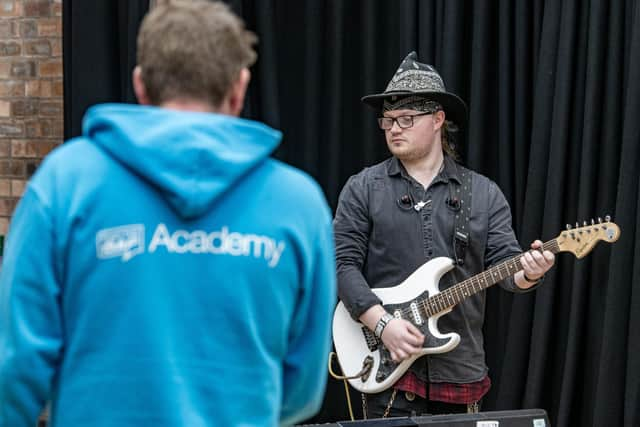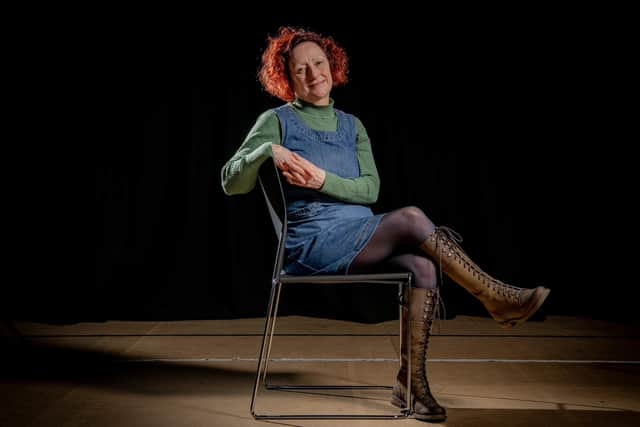Mind the Gap: Bradford academy for learning disabled and autistic performers looks ahead after National Lottery funding
Miles Davis’ So What is coming out loud from a studio where a group of young dancers move along to his groundbreaking jazz. Underneath the Juliet balcony of the low-lit theatre space next door, people busily prepare for a future performance.
Pretty standard scenes in the dramatic arts, perhaps. Bradford-based Mind The Gap, though, strives to go way beyond ‘pretty standard’.
Advertisement
Hide AdAdvertisement
Hide AdFor more than 30 years it has given opportunities for people with learning disabilities and autism to develop the skills needed for a life in theatre, music, dance and other performing arts - and lays claim to being the most comprehensive organisation of its kind in the region.


Julia Skelton, executive director, is clearly proud of what she and her team have built since she joined in 1997 – and having recently received a £300,000 grant from the National Lottery to widen the scope of its community work over the next three years, she is still looking ahead.
"The journeys that you see people having been on, the personal and professional growth that people have been supported with – our staff really care. They are really passionate about change and quality and making exciting work. They are industry professionals, they’re practising artists – they are driven by high-quality, artistic endeavour and so that’s what you can be part of if you join up.”
But she says: “We don't want to be the only answer. We don't want to be like a bottleneck, and that can be a challenge because there's great talent around and we want to protect and continue to develop and nurture it. But in an ideal world, and our informal motto has been for many, many years, since the company started in 1988: ‘An intention to do ourselves out of a job’. Because everybody else is already doing it, so therefore Mind the Gap doesn't need to be providing that bridge.
Advertisement
Hide AdAdvertisement
Hide Ad"The reality, of course, is it’s a complex world and particularly in the current climate when resources for arts and creative activity are limited and (there is) enormous competition and pressure for what’s out there.”


Julia didn’t train in the arts but has always loved it and after graduating from college got a placement at Buxton Opera House in Derbyshire, where she became marketing manager, before taking up the same role at Harrogate Theatre.
When she joined Mind The Gap, which was founded by Tim Wheeler and Susan Brown, as administrative director to co-lead the company, her first job was to create an application for National Lottery funding. The success of that request was a “step change” for the organisation - meaning they could put infrastructure and a team in place to build its future.
The company started in a Girlington attic room and has moved about over the years, to areas such as Queen’s Road in Manningham and the city centre, before settling in its current location at the redeveloped Lister Mills in 2008 - a process which took seven years.
Advertisement
Hide AdAdvertisement
Hide Ad“It was kind of born out of necessity because we wanted to make sure that we had a space that could offer access to all areas for everybody,” says Julia.
It now has three studios, with Studio One being its largest space, equipped for small-scale touring companies with professional lighting and retractable seating for 120 people, but also a training space for students.
The company’s Performance Academy - offered in partnership with York St John University to ensure it is validated to Certificate of Education Level 4 - is designed to cater for the needs and creative aspirations of learning disabled and autistic people. The three-year course offers comprehensive training in theatre, music, dance, and industry studies, also focusing on building confidence, communication and teamwork. Students benefit from detailed one-on-one assessments at fully equipped, safe studios.
Julia says: “The journeys of some of the students from those that have that first year of literally being quivering and being so full of anxiety and nerves, and now really able to hold their hold their own in that sort of framework and enjoy it and celebrate it - I think that's been one of the really interesting developments and achievements.”
Advertisement
Hide AdAdvertisement
Hide AdMeanwhile, the organisation also offers day courses which run over 35 weeks.
“We draw people from all of West Yorkshire and North Yorkshire as well because there is nothing of the same depth and length of quality of service,” says Julia.
Those who have been through the doors of Mind the Gap include Liam Bairstow, the first person with Down Syndrome to appear in a recurring role on Coronation Street, and the learning disabled artist and performer JoAnne Haines.
Testimonials from students, shared by the company, include: “It feels like a very positive place every day”; “I'm the kind of person who likes to just get on with it in every art form and we do that here in the building”; and “I feel very supported because everyone is very kind, understanding, lovely, make you feel very welcomed, they don't put you on the spot and they explain the information a lot clearer”.
Advertisement
Hide AdAdvertisement
Hide AdStudents have also relished “working on the showcases and having an opportunity to perform on stage”; “showing off what we've learnt/developed at the end of the year to a big audience”; or “working towards my next steps in life”.
But it takes about £150,000 a year to keep the doors open, and that excludes the cost of staffing (there’s about 40 full and part-time people on the payroll, including 13 learning disabled artists, but they work with many more) and other activity.
“Meanwhile, the West End is thriving,” she Julia. “It's not the same world really. Bradford's got a network of absolutely amazing individual artists and small companies who are working in brilliant, innovative ways but it's so hand to mouth at the moment, it does worry me.”
Advertisement
Hide AdAdvertisement
Hide AdThen there’s the matter of whether the industry itself is that inclusive or accessible.
"Quite a lot of what we do is simply thinking about how you break things down into smaller steps and trying to make really clear and really transparent what it is we are doing.”
That could mean providing scripts in audio instead of written format, for example.
"If you watch or listen to mainstream arts programmes – I’m just going to give example of Front Row on Radio 4 – there’s so much jargon, there’s so much language that’s industry language but is very inaccessible for people if they’re just starting out – that’s not not exclusive to people with disabilities, it’s true of anybody, really – (but) there’s so many things that are assumed but not really explained and a lot of assumptions about what’s imporant and what’s not important.
Advertisement
Hide AdAdvertisement
Hide Ad"Part of our job as a company, across the board, is to be a thorn in the side of that.”
Another example is when theatres put on works from the established canon – Shakespeare, for example – which can present barriers for some of the people which Mind the Gap trains.
Julia adds: "I find it very frustrating, personally. I totally understand and accept that things are very challenging in the arts and creative sector at the moment and very difficult decisions are having to be made around what gets made, who it gets made for, how it gets made. But the retreat back to a lot of very classic traditional theatre work - I do challenge whether that's the way for us to think about a thriving, creative sector into the future.”
On the contrary, audiences are interested in experiences and “untold stories” which “encourage people to look at and think about things differently”.
That’s a space which Mind the Gap is ever ready to fill.
Comment Guidelines
National World encourages reader discussion on our stories. User feedback, insights and back-and-forth exchanges add a rich layer of context to reporting. Please review our Community Guidelines before commenting.